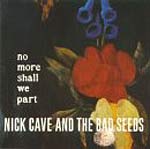

Nick Cave And The Bad Seeds
No More Shall We Part
(Mute/Elektra)
When I heard the last album by Nick Cave and the Bad Seeds (The Boatman's Call), I thought it would be more of a quiet reprieve than a new direction. It was quiet and stripped down and introspective while still being excellent, and upon the first couple listens I couldn't help but wish for the louder sounds of older releases like Let Love In or even Tender Prey. When I heard that he had a new release coming out again this year, I wondered just what direction the release would again go in. Cave isn't exactly the easiest person in the world to read (after all, he is a fellow who wrote an entire album where at least one person per song died with Murder Ballads), but I know that I had expectations.
Admittingly, those expectations were a bit let down upon the first listen of No More Shall We Part. In many ways, it's like the above mentioned The Boatman's Call in that its an album that relies mostly on quiet introspection to make points, but it's also a step forward from that release for many reasons. One of these is that while the instrumentation is still fairly sparse on some tracks, it's a more lush sparse and Cave has added some nice elements (like female backup singers on a couple tracks) that help to fill things out even more. Again, he's assembled quite an amazing group of musicians as the Bad Seeds and Warren Ellis (of the Dirty Three) is particularly left to shine with some amazing violin work on several tracks.
In terms of sheer weight alone, the album can almost be a bit crushing. With 12 songs that run nearly 70 minutes of time, Cave takes his time getting there, but you really don't mind. After starting out with the first single "As I Sat Sadly By Her Side" and the title track, the beautiful (and almost epic length) "Hallelujah" starts and slowly builds from the aforementioned violin by Ellis until guitar, piano, and many other instruments are added. The gospel-like chorus just works as a reinforcement of the religious themes that are explored on the album (more obviously along with tracks like "Oh My Lord" and "God Is In The House").
If you can believe it, Cave is even sounding a bit soft on the whole relationship side of things with tracks like the string-backed "Love Letter" and "Sweetheart Come." If he is getting more quiet and reflective with age, he's sure managing to do it quite gracefully and in a way that only really he could do it (with vivid imagery that is still obviously his work). Even with all the above, though, there are a few moments where Cave really lets loose and goes with things. Both "Fifteen Feet Of Pure White Snow" and "The Sorrowful Wife" build into loud endings that add a nice bit of frenzied passion to the proceedings.
If you're a fan of Nick Cave imagery and lyrical turns, you're not going to be disappointed by this release, even though the subject matter isn't quite as dark as usual (although it's still a dark grey most of the time) and he's definitely taken a more reflective tone. Not only that, but he shows off quite a vocal range on the disc (not like he hasn't before), doing much more with the quiet vocals than he did on The Boatman's Call. It's quite a batch of music to listen to in one sitting, but if you're a fan like I am, you know that when you're in the mood for Cave, you're in the mood.
Rating: 7.5